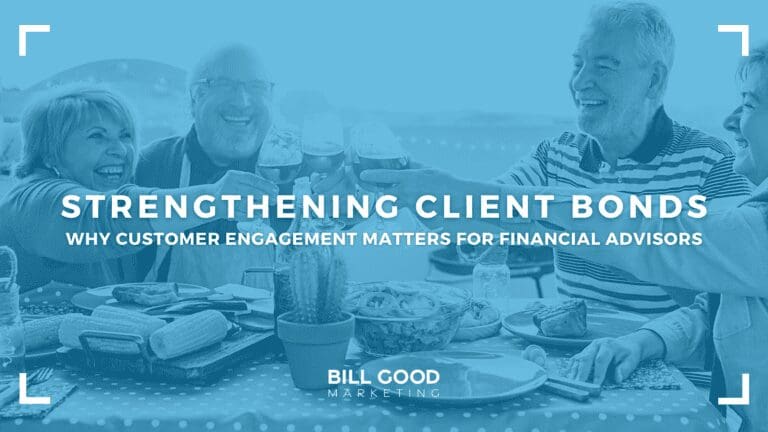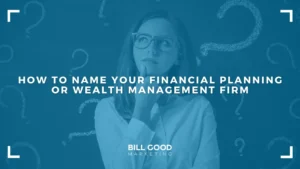Client Engagement Defined
It’s becoming increasingly difficult to capture new clients and retain their business and loyalty as well. With various alternatives on the table, clients are looking for a bit more than your expertise. On top of your insights as an advisor, clients expect a much more positive experience when signing up for your services.
At its core, client engagement for financial advisors is about connecting with your clients on a human level and truly understanding their unique needs and goals. It’s not just about providing a service or product, but rather, about fostering a relationship built on trust, empathy, and communication.
It’s a continuous process where you add more value to your services by being a trusted partner that helps them with their unique financial needs. By providing a consistent positive experience through effective customer engagement, you can improve customer loyalty, brand awareness, and business growth.
Client engagement requires a customer-centric approach that prioritizes customer satisfaction and retention over short-term profits.
You can build stronger relationships with your clients by providing a VIP experience for every client and making sure that they know that they’re not just another number in your system.
All of your customer interactions are an opportunity to improve your client engagement initiatives. Create a client-centric experience that exceeds customer expectations and aims to foster a long-term relationship.
Ultimately, client engagement is the key to building a long-lasting, profitable business that is built on a foundation of loyalty, trust, and mutual respect. By putting your customers’ needs first and consistently delivering high levels of service, you can create a positive customer experience that truly sets you apart in a crowded marketplace.
The Importance of Customer Engagement for Financial Advisors
Trust is the cornerstone of any financial advisory relationship, and high levels of engagement foster this trust. Engaged clients are also more likely to stick around, leading to higher client retention rates.
According to YCharts’ 2022 report, 88.2% of clients will consider your frequency and communication style when deciding if they’d like to retain your services.
Moreover, satisfied and engaged clients are your best advocates. According to the same report, 89.7% will consider your engagement when referring you to friends and family.
This word-of-mouth marketing is incredibly powerful, as people tend to value recommendations from people they know and trust. By focusing on client engagement, financial advisors can not only retain their existing clients but also attract new ones.
The Impact of Customer Engagement on Client Retention
Engaged clients are less likely to look elsewhere for financial advice.
Why would they need to turn to a Google search or strangers on the internet when they can get advice that’s tailored to their financial situation?
The only catch in this case is your clients need to remember that you exist and can help them with the problem they’re facing.
Engaging with your clients often is a good starting point to make sure you stay top of mind. On top of that, you can also leave an impression by giving them some kind of value with every customer interaction—whether that’s a unique experience, a positive feeling, or more valuable knowledge on how to manage their financial life.
Unfortunately, one bad experience is usually enough to get them to look for alternatives.
Perfect the customer engagement strategy across all touchpoints in your customer journey and make sure that clients feel satisfied when they walk out the door.
Customer engagement fosters loyalty and trust. And loyal customers are more likely to stick with you, even during tough times. By making an effort to understand your clients on a personal level, you create a bond that is hard to break.
Take the time to connect with your clients—it could mean the difference between a lifelong relationship and a breakup. Make sure that your client leaves every interaction feeling valued by perfecting your client engagement strategy.
With the aid of a customer relationship management (CRM) system, financial advisors can efficiently manage their customer data. A dedicated CRM system makes it easier for you to collect, review, and use data of everyone in your pipeline, including your target audience, potential customers, new customers, and people who’ve been with you for years. Based on customer behavior recorded in your CRM, customer feedback, and previous customer engagement metrics, you’ll be able to discover opportunities left on the table and move accordingly.
Client Engagement and Referrals
Inbound strategies like content marketing and social media is still necessary to grow your marketing engine. Outbound approaches, like cold outreach might also help you win a book or two.
Yet, word of mouth is still the most powerful way to get new clients. A personal recommendation from your current client holds a lot more weight than any other social proof. A personal recommendation bridges that trust gap you often run into when getting clients through other channels.
Fortunately, your current clients are walking case studies for your business. And better yet, they often run in the same circle as more of your ideal clients.
Satisfied clients who feel a strong connection to their advisor are more likely to recommend them to others. By perfecting your client engagement and providing a great customer experience, you ensure that your clients have plenty of customer success stories to tell when they’d like to refer you to one of their friends.
Think about it—when was the last time you recommended a service or product to someone else? Chances are, it was because you had a great experience and felt confident in the product or service. The same applies to financial advisors. When your clients have a positive experience and trust your advice, they will be more inclined to recommend you to others.
On top of that, you need to implement a system in place to make sure that you’re collecting those referrals.
A popular way to do this is by soliciting referrals from current clients and offering incentives or loyalty programs for successful referrals.
However, if you’re still asking your customers point blank if they know someone that might need your help and sitting in uncomfortable silence as they try to think on the spot, you need to look for a better system. Head to this webinar if you’d like to learn more about how you can prompt more unsolicited referrals from your clients and make sure that you’re the first advisor they’ll think of the next time someone in their circle asks for a recommendation.
Customer Engagement and Business Growth
Client engagement goes beyond just maintaining customer retention and brand loyalty. When you focus on client engagement, you become more than just a service provider. You’re a trusted partner in your clients’ financial journey, providing personalized solutions that cater to their unique needs and goals.
Each successful customer engagement campaign means you just boosted your value in your client’s eyes. Engaged clients are more likely to stay with their advisor, refer others, use more of your services, or ask you to manage more of their assets—all of which contribute to business growth.
By becoming a client’s primary advisor, you’re winning their business for life. You’re also growing your customer base without the uncomfortable solicitation process by putting your name at the top of their mind when speaking to their friends, family, and acquaintances.
Strategies for Enhancing Customer Engagement
Being a financial advisor is not just about providing sound financial advice. It’s also about building connections with your clients, understanding their needs, and providing them with a personalized experience that they won’t forget.
Here are some key strategies that can help you improve client engagement and build relationships that will help you get lifelong advocates for your services.
- Regular communication helps you stay top of mind. At the bare minimum, try to circle back to prospects and clients every 90 days. This could be through regular check-ins, newsletters, or updates on the financial market. One of the most impactful ways to do this is by sending personalized letters each month with messages that will make them remember you—whether by giving value, entertaining them, or making them feel appreciated.
- Personalization is another important strategy. There are many ways to personalize. This could involve tailoring financial advice to each client’s unique needs and circumstances. You can also send letters during special days, such as their birthdays or anniversaries.
- Sharing educational content that you know is relevant to their situation can also help clients understand how much you care about their goals. This could involve creating articles, webinars, or workshops that help clients understand their financial situation better.
Reassess Your Customer Engagement Strategy with Bill Good Marketing
With various other alternatives, including competitors, robo-advisors, financial forums, and even search engines, you need to make sure that you’re an irreplaceable component in your client’s financial life.
Financial advisors who prioritize client engagement are in the best position to build strong, lasting customer relationships with loyal customers who are committed to their brand.
By keeping customers at the center of their business model and actively seeking to understand and meet their needs, advisors can create a customer experience that is truly transformative.
This means using strategies like CRM automation to enhance customer interaction, fostering a customer-centric culture within the organization, and leveraging technology to stay ahead of the curve. In doing so, advisors can dramatically reduce churn and improve customer retention, ultimately driving growth and profitability in their business.
If you’d like to learn more about how you can optimize engagement for your customer lifecycle, we can help. It’s likely that you have more questions than answers at this point, such as:
- How do I spot gaps in my current client experience so I can optimize those opportunities?
- How can I use customer engagement to support my marketing strategy and future marketing campaigns?
- What kind of KPIs and metrics should I use to measure customer engagement success?
Bill Good Marketing offers a range of resources and services to help advisors implement these strategies effectively. From coaching and consulting services to a wealth of educational content, we use our decades of experience in growing financial advisory firms to help you grow your practice.




